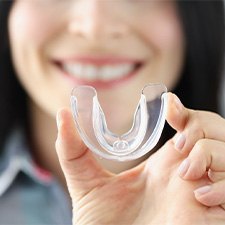
Dental Implants – Fuquay-Varina, NC
A Second Act For
Your Smile
Are you eager to put your tooth loss behind you permanently? Ready to stop dealing with sore gums or uncomfortable dentures? With dental implants, Dr. Langworthy can breathe new life into your smile by offering you a beautiful, long-lasting solution that will help you look and feel like your teeth never went missing in the first place. Whether you’re missing a single tooth or all of them, she can ensure that your smile’s best days are ahead of you. To get started, contact us today to discuss tooth replacement with dental implants in Fuquay-Varina, NC.
Why Choose Langworthy Family Dentistry for Dental Implants?
- Friendly, Vibrant Dentist with Special Training in Dental Implants
- Highly-Skilled Dental Team That Will Always Put Your Needs First
- 100% Custom-Designed Dental Implant Restorations for Each Patient
What are Dental Implants?

If you were to look at a dental implant, you’d likely say, “That doesn’t look anything like a tooth!” and you’d be right! An implant is actually a prosthetic tooth root made of titanium that is placed into the jawbone. There, it undergoes a process of bonding directly to the bone, which is called osseointegration. Once this is complete, a new crown, bridge, or denture can be attached on top, bringing back the tooth/teeth from top to bottom.
The 4-Step Dental Implant Process

To someone who is unfamiliar with how dental implants work in Fuquay Varina, this option may seem overwhelming. Although sometimes more complicated, the dental implant process can usually be broken down into these steps:
- Consultation.
- Surgery.
- Osseointegration & Abutment.
- Restoration.
In all, treatment may take anywhere from six months to a year to complete, but each of these steps is essential for your implants’ success and your smile’s long-term stability. If you have questions about these steps, don’t hesitate to contact us and ask.
Initial Dental Implant Consultation

You’ll sit down with Dr. Langworthy, and after giving you a thorough exam and taking some X-rays, she’ll go over your replacement options, including implants. During this appointment, feel free to ask any questions you may have about the procedure, the advantages and disadvantages of this treatment, potential timeline, and other concerns. She can also help prepare your mouth for implants through gum disease treatment or tooth extraction if necessary.
Dental Implant Surgery

If you and Dr. Langworthy both decide that implants would be the right choice for you and that you are prepared for the procedure, she’ll prepare you for the surgical placement of the new roots into your jawbone. Thanks to her advanced training in dental implant sugery, she will ensure you receive the highest quality of care. This procedure entails making small incisions in the gum tissue, which means you’ll need a couple of days to recover afterward.
Dental Implant Osseointegration & Abutment

Over the next 3-6 months, your jaw will be given time to heal and bond with the implants. You’ll be fitted with temporary teeth during this time. This process, which occurs beneath the gums, is called osseointegration. When your implants are integrated with the jawbone, a small connection piece called an abutment is attached to the implant. The abutment will stick out above the gums and will join the restoration to the implant.
Delivery of Dental Implant Restoration(s)

Once your mouth is ready with abutments, you’ll return to Dr. Langworthy so she can take impressions of your upper and lower arches. These impressions will be sent to our dental lab, where the restoration(s) will be fabricated. Finally, after they’re complete, we can then attach your custom, permanent teeth to your implants. At that point, you can treat and enjoy them just as you would natural teeth!
Benefits of Dental Implants

Over 500,000 dental implants are placed every single day. They are becoming more and more popular, and there is no wonder why. Dental implants are uniquely placed in the jawbone, so they are able to provide a wide array of benefits that you cannot find elsewhere. Here are just some of the ways that dental implants can dramatically improve your confidence, health, and quality of life.
Day-to-Day Benefits

Once your gums and jawbone have healed, your replacement teeth shouldn’t feel any different from your natural ones. You may even forget that they are there! Here are just some of the benefits you can experience every single day:
- Easy Maintenance: There isn’t a special way to care for your dental implant. You just need to use all of the same practices you would for natural teeth. Brush twice, floss, and rinse with mouthwash every day. You should also continue to attend regular cleanings and checkups.
- Stronger Bite: Dental implants can restore your bite force up to 90%. This is much more than you can expect with traditional bridges and dentures.
- Increased Confidence: If you have gaps in your smile, it can be easy to feel self-conscious. With dental implants, you can show off your smile with pride.
Health Benefits

Dental implants positively influence your health. Here are some of the ways that dental implants can benefit your well-being:
- Improved Dental Health: Missing teeth increases your risk of further dental problems. This includes gum disease, misalignment, and additional tooth loss. Dental implants help to prevent these negative effects.
- Better Overall Health: Dental health and overall health go hand-in-hand. When you have better dental health, you are at lower risk of several life-threatening conditions, including diabetes and heart disease.
- Prevents Bone Loss: When your jawbone isn’t being stimulated through regular chewing as a result of tooth loss, it will be reabsorbed by the body. Fortunately, dental implants replace the roots of the missing teeth. This way, they can stimulate your jawbone and prevent bone loss.
Long-Term Benefits

Dental implants have a higher cost than traditional dentures and dental bridges, but it makes sense why. Dental implants are an investment in the future of your smile. Here are some of the benefits that you can experience every single day:
- Successful: Dental implants have an incredible success rate of over 95%! Dental implant failure is very unlikely.
- Long-Lasting: Other tooth replacement options, like dentures, need to be relined or replaced periodically. However, implants are made to last for many decades. You may never have to worry about your missing teeth again!
- Save Money: Dental implants might have a higher upfront cost, but they last a longer time, so you don’t have to replace or repair them periodically. Dental implants also help to prevent oral health issues that are expensive to treat. Ultimately, you can take some of the pressure off of your wallet.
Who Dental Implants Can Help

One of the best things about dental implants is that they are extremely versatile and can be tailored to suit patients dealing with any degree of tooth loss. All that a patient needs to bring to the table is decent oral health as well as a strong enough jawbone to support the roots. Dr. Langworthy can also help a patient if either of these is an issue. When a patient is ready, they can select which of the following procedures would best fit their situation:

Missing One Tooth
Rather than filing down multiple teeth to make room for a bridge, a single implant and crown can be positioned between two healthy teeth without disturbing them at all. This is a more conservative and long-lasting approach.

Missing Multiple Teeth
Two implants can be placed at either end of a large gap in the smile to serve as the foundation for a bridge that holds 2 to 4 teeth. Not only are implant bridges stronger than regular ones, but they look more lifelike as well.

Missing All of Your Teeth
With as little as 4 to 6 implants, a patient can replace an entire row of teeth with a full denture. Unlike removable dentures, implant dentures restore practically all of a patient’s bite strength, allowing them to eat whatever they like without having to worry about their teeth moving or falling out.
Maintaining & Caring for Your Dental Implants

As the ultimate tooth replacements, dental implants can keep your smile healthy and strong for a lifetime. However, the truth is that they only work well when they get regular and proper care. Neglecting the metal posts will cause early implant failure and lead to pricey dental work. Luckily, our practice knows a lot about dental implant care in Fuquay-Varina. Just keep reading or call our office to learn the relevant tips and tricks.
Make Oral Hygiene a Priority

While dental implants don’t decay like your enamel can, they do require a healthy mouth. Placing the posts near weak teeth or gums will make them unstable. For example, a bout of gum disease could easily loosen implants near the infected tissue. You’d then be at serious risk of losing your new tooth.
The best way to avoid such risks is to practice good oral hygiene. With twice-daily brushing and once-daily flossing, you’ll make mouth-related threats to your implants less likely. The result should be that your new teeth stay strong and last longer.
Eat a Healthy Diet

Though dental implants can handle most meals, junk food is still a bit iffy. Chewing sugary and sticky stuff can cause debris to wedge between your implant posts. Should that happen, the pieces could cause tooth decay or gum disease – problems that trigger implant failure.
Given these facts, you’re honestly better off with a mouth-healthy diet. Foods with calcium, phosphorus, and vitamin C can help implants thrive. By absorbing those nutrients, you’ll make your jaw’s bone tissue stronger and lessen your chance of getting gum disease.
Break Bad Habits

Since they use sturdy titanium and porcelain, dental implants can put up with a lot. Even so, these replacement teeth can still fail if you practice bad oral habits. That means you should quit such quirks as soon as you can.
In fact, various oral habits can cause implant failure. Using tobacco is a prime example – doing so delays your treatment recovery and keeps the posts from working. Tendencies like chewing fingernails, ice cubes, or pencils could also break your implants’ surfaces.
Protect Your Dental Implants

To be clear, dental implants can break when put under enough force. It’s best if you take steps to protect them from injuries and incidents.
An ideal method for defending your implants is wearing a mouthguard. By using a special one for sports, you could shield your teeth (natural or not) from outside forces. A nightguard would also help keep from grinding your arches while asleep. If possible, you should try to get both to keep your implants safe.
Schedule Regular Dental Checkups

Even if you use the tips above, you can’t care for dental implants alone. You’d inevitably miss or overlook threats to your restorations’ success. Given that fact, remember to attend your regular dental checkups and cleanings. Those visits let dentists monitor your implants and check their viability.
Note that dental checkups are top-tier preventive oral care. Since they frequently diagnose and treat your smile, they prevent threats to your new teeth. You can expect that much from a trained and experienced dental team. So, make your checkups and cleanings effective by doing twice-yearly visits.
Understanding the Cost of Dental Implants

The cost of dental implants in Fuquay-Varina shouldn’t stand in your way of replacing your missing teeth. Contrary to many rumors, dental implants are more affordable than you might realize. Although there’s not a flat rate for a new tooth, we strive to keep a complete smile within everyone’s budget. We have the financial solutions you need to invest in the next best thing to your real teeth.
Preliminary Treatments & Dental Implant Surgery

Every case differs, so no two treatment plans are identical. The amount you’ll pay is determined by your specific needs and preferences. Although every situation is unique, you can expect your estimate to include:
- Preliminary Treatments: You may require prep-work before getting dental implants in Fuquay-Varina, like gum disease treatment or tooth extractions.
- Placement Surgery: Sedation or anesthesia will keep you comfortable while an implant post is placed in your jaw.
- Number of Teeth: The more teeth you’re treating, the more you can expect to pay.
- Materials: Discounted materials can save more upfront, but they’ll cost more down the road because they may not be as durable.
Rest assured; you’ll know exactly how much you’ll have to pay before committing to anything.
The Parts of Your Dental Implant

Your implant dentist in Fuquay-Varina can treat one, multiple, or all your missing teeth. Your estimate will include each part of your dental implant, including:
- Post: An implant post replicates a root to stabilize your restoration.
- Abutment: Each post will require an abutment to attach your restoration.
- Restoration: You’ll need either a single crown, bridge, or denture to replace your missing teeth.
How Dental Implants Can Save You Money

Believe it or not, dental implants are the most cost-effective method of treating tooth loss. Traditional prosthetics only last for a few years before needing to be replaced, but dental implants can thrive for decades. You’ll never need to budget for replacements with the right aftercare, like maintaining your oral hygiene. Not to mention, dental implants lower your overall oral health expenses. The implant posts will keep your jawbone strong to prevent common issues associated with missing teeth, like cavities and gum disease.
Does My Dental Insurance Cover Dental Implants?

Don’t expect your dental insurance to cover the entire cost of the procedure; however, it can be used to lower the amount you pay out-of-pocket. You can use your policy to offset the fees for certain steps in your plan, like the consultation, imaging, or restorations. We will work on your behalf with your insurance company to maximize your annual benefits.
Making Dental Implants Affordable

We make it easy to rebuild your smile, even if money is tight. Besides using your dental insurance, we offer multiple payment methods, including:
- Traditional Payments: We accept all traditional payment forms, including cash, checks, and credit cards.
- Third-Party Financing: Pay for your new smile using monthly installments through a third-party financing company, like CareCredit.
- In-House Savings Plan: Enjoy reduced rates for specific services by joining our in-house savings plan.
If you have any questions about your payment options, or you are ready to schedule your consultation, contact our office today.
Dental Implants Post-Op Instructions

When you have any type of oral surgery performed, you can expect to be given a list of instructions to follow after the procedure is complete. Dental implant surgery is no exception; until the healing process is done, it will be up to you to take care of your mouth and manage any discomfort that you might be experiencing. You can start preparing for the dental implant process right now by taking note of the following post-op instructions that our team is likely to give you.
What to Do Directly After Dental Implant Surgery

Once dental implants have been placed, you will need to focus on making sure the surgical site remains undisturbed. This is to protect the blood clot that will form as part of the body’s natural healing process. Using a straw, smoking, and spitting are examples of actions that might dislodge a blood clot; you should therefore make a point of avoiding them until your mouth has sufficiently recovered.
Common Side Effects When Recovering from Dental Implant Placement

Our team will explain what symptoms are normal after dental implant surgery as well as what you can do to keep them under control. Common side effects include discomfort (which can be reduced with over-the-counter medication), swelling (which you can keep down with a cold compress), and intermittent bleeding (which can be stopped by pressing down on the area with gauze). Please let us know immediately if any unexpected symptoms occur.
Your Diet After Dental Implant Surgery

For a few days after your surgery, you will be instructed to eat only soft or liquid foods. Soup is probably one of the first options to come to mind, but while it can be a great choice, you will need to make sure that it isn’t too hot. Other common examples of soft foods that can safely be enjoyed after dental implant placement include yogurt, scrambled eggs, and mashed potatoes.
Post-Op Health & Oral Hygiene

An oral infection is one of the last things you want to occur while you’re still recovering from dental implant placement. Keep your mouth clean by rinsing with salt water multiple times a day. (You can also use mouthwash as long as there’s no alcohol in it.) You will still be able to brush your teeth, but you will need to exercise caution; specifically, you should be very careful when cleaning around the implants.
What to Do After Your New Teeth Are Attached

At the end of the dental implant process, your new dental prosthesis will be attached to your implant posts. There won’t be any extensive recovery period to worry about at this point, but you might need to take pain relievers to deal with sensitive gums. Bleeding and swelling are not normal at this stage; if they occur, call us right away.
Dental Implant FAQs
Can I Take Dental Implants Out?
Dental implant fixtures (the titanium rod implanted into your jawbone) can only be removed by Dr. Langworthy or Dr. Harn . Once placed, the jawbone begins to grow around the fixture and fuse to it. This is why once fully seated; a dental implant cannot be removed unless by our dental professionals at Langworthy Family Dentistry . However, it’s important to note that certain restorations like implanted dentures can be made to be removed for cleaning. Most other restorations like crowns and bridges can be removed at our office if they need to be replaced but are otherwise permanent.
Does Getting Dental Implants Hurt?
There is some discomfort involved in getting your dental implant fixtures placed. However, it is minimal thanks to the advanced anesthetics we use. Once your gums have been numbed, you’ll only feel some slight pressure when the surgery begins. Most of the discomfort as a result of your treatment will come in the days after the procedure as your mouth is healing. However, this can be managed with over-the-counter pain relievers like ibuprofen. If you begin to feel prolonged or very strong pain around your implant site after a few days, call us to schedule a follow-up appointment.
Do Dental Implants Decay?
Implant fixtures and the ceramic restorations attached to them are not affected by oral bacteria. This means that they cannot get cavities or decay. However, your remaining natural teeth and the gums around the implant site are still susceptible to bacterial plaque and oral issues like gum disease and dental caries. Even if you have all your teeth replaced with implant dentures, it’s still important to continue your oral hygiene routine. Doing so will prevent the spread of harmful oral bacteria and keep your implants healthy and strong.
Do Dental Implants Make You Look Younger?
Over time, as your tooth loss progresses, your jawbone will begin to deteriorate. The more teeth you’re missing and the longer you wait to have them replaced, the more pronounced this atrophy becomes. Some patients with multiple missing teeth see their cheeks begin to hollow and their jaws begin to shrink inward due to bone resorption. Dental implants are the only tooth replacement treatment that stops the gradual loss of bone. This prevents face shrinkage and can help keep your cheeks, lips, and facial muscles supported for a more youthful appearance.